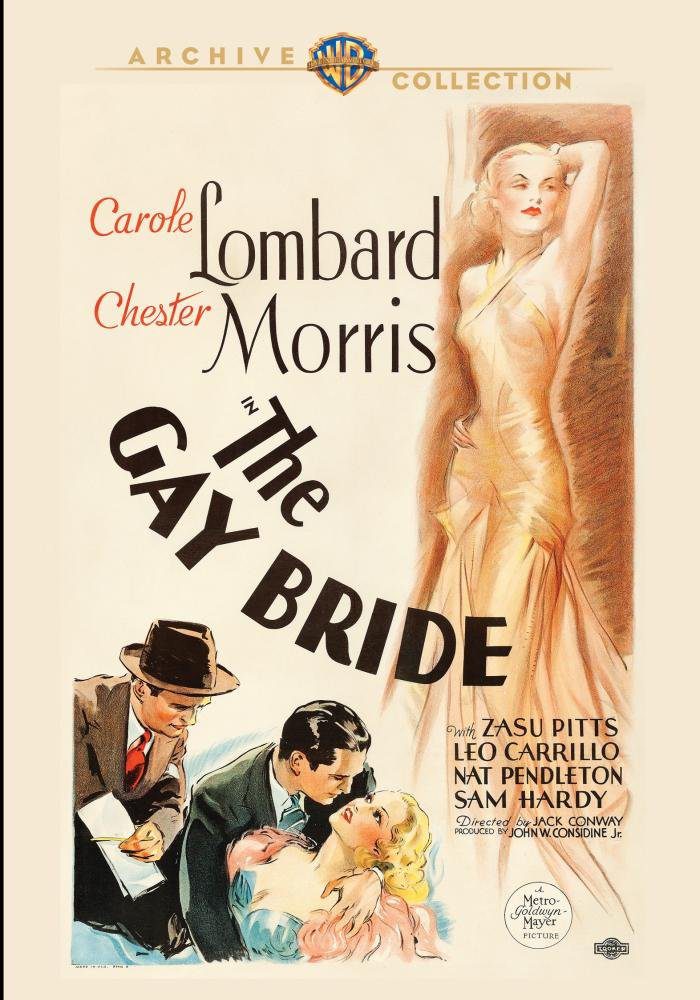
Some marriages just need a little time to get things right. Crafted at the tail-end of Hollywood’s golden age of gangster pictures, MGM’s classic screwball comedy The Gay Bride failed to wed audiences upon its initial release in 1934. But when I first witnessed this union betwixt Carole Lombard and future Boston Blackie star Chester Morris 84 years later in 2018, I found this once-dejected Bride to be quite worthy of a suitor ‒ Gay or otherwise.
Set in New York (but clearly filmed in Los Angeles), the film stars the legendary Ms. Lombard (on-loan from Paramount for her one and only MGM production) as Mary: a struggling stage actress with a solid craving for sugar daddies (much like many of the women I meet on Tinder). And she finds just that in the guise of bigshot bootlegger “Shoots” Magiz (the great Nat Pendleton, at his hammiest, goofiest best), who is more than willing to give the beautiful blonde his all no matter what ‒ to the point where he even entrusts his loyal bodyguard-for-hire “Office Boy” (portrayed by Chester Morris and his distinctly-chiseled face) to keep her safe from rival gangsters as well as his own amoral associates, who also lust after the gorgeous gold-digger.
But good ol’ Office Boy sees through Mary’s various charades, trailing the conniving con-artist throughout whilst delivering one deadpan quip to her face after another. (In fact, Chester Morris is so deadpan and cynical in this film, I wondered if I hadn’t found footage of myself in a previous life at first.) His painfully truthful jabs go unnoticed by all parties, naturally, as Shoots is too thick-headed to notice what’s really going on, and Mary is too busy deflecting her actions (or defending them) to realize the sweetly sarcastic Office Boy may actually be trying to give her some life-saving advice. Such as when he hints that Shoots’ estimated wealth is in dire straits thanks to the repeal of Prohibition.
Indeed, the gangster’s grandiose legacy is about to come to an end ‒ in every respect. For The Gay Bride is not at all above killing off a supporting character in the name of comedy, which we learn when Shoots’ Number One man Dingle (Sam Hardy, King Kong) arranges an explosive ending for his boss. When Mary is devastated to find out the money she has extorted saved up from her brief marriage to Shoots has been confiscated by the authorities, she sets up a competition between Dingle and the other remaining member of this bizarre wedding party, Mickey the Greek (fourth-billed Leo Carrillo, taking a break from portraying Mexican stereotypes in lieu of a different one): whoever sets her up with a “trust fund” first gets to marry her.
WIll Merry Widow Mary become Mrs. Dingle-Mary? Or will she host a big fat Greek wedding? Personally, my money is riding on Mary and Office Boy both coming to their senses before it’s too late for anyone else to lift a ring finger. While the bulk of the material here is moderately amusing by ’30s standards at best (even if it only had one good joke in the picture, it’d still be funnier than My Big Fat Greek Wedding), The Gay Bride ultimately succeeds in my opinion thanks to its two leads. Though neither of them were really “into” the production ‒ Ms. Lombard declared it one of her worst, while Mr. Morris felt he was making a turkey even as the cameras were rolling ‒ they truly domake this estranged marriage work.
Adapted from Charles Francis Coe’s novel Repeal by screenwriters Bella and Sam Spewak (My Favorite Wife, Kiss Me, Kate) and directed Jack Conway also features iconic comedienne ZaSu Pitts as Lombard’s faithful friend. At one point in time, Pitts and Thelma Todd starred in a series of Hal Roach two-reelers as the female counterparts to Laurel and Hardy, wherein she showed off her adept comedic skills. You’d never know that by watching her third-billed performance in The Gay Bride, however, as he screentime is limited and her varied talents go unnoticed. An uncredited cameo by Eddie “Rochester” Anderson generates more laughs than her entire role.
Also featuring Walter Walker, Irving Bacon, and Gene Lockhart, The Gay Bride suffered from a rewriting of the story, done in order to appeal to the newly-established Production Code, eliminating racier content that probably would have made the movie “genuinely” funny in 1934. 30 years later, clips of the film showed up in Robert Youngson’s MGM’s The Big Parade of Comedy (also available from the Warner Archive), but I cannot say if that was a good thing or not, as the aforementioned “documentary” was little more than a lazily-edited compilation. By today’s standards, however, The Gay Bride succeeds in turning a head or two at the altar, and I’m quite happy to see make its digital home media debut here from the Warner Archive Collection.
Culled from the best existing materials available, the WAC presents The Gay Bride as a Manufactured-On-Demand DVD-R release. The film is shown in its original 1.37:1 aspect ratio, and shows its shares of (mostly minor) imperfections, none of which mar one’s ability to enjoy the finely-aged elements of comedy. The mono soundtrack comes through without a hitch (ha-ha!), thus enabling Lombard and Morris’ various verbal attacks upon each other to be heard ‒ and, hopefully, appreciated ‒ all the way through. No special features are included with this lost gem from the Warner Archive vaults, but then, I don’t recall ever receiving a gift at somebody else’s wedding anyway, so why would I here?
So just sit back, crack open a bottle of Shoots’ hooch, and enjoy the many quarrels headed your way.
Recommended.